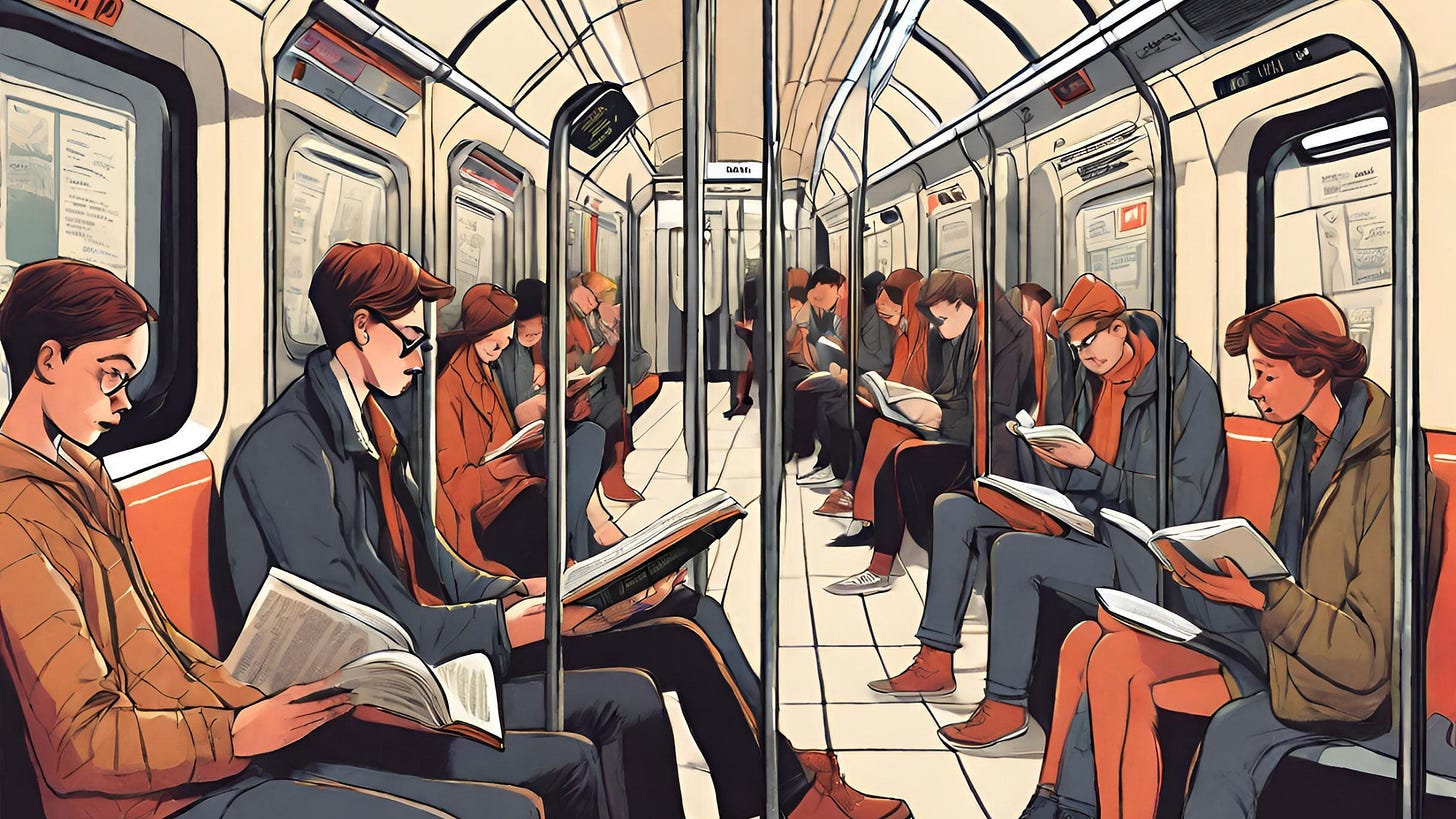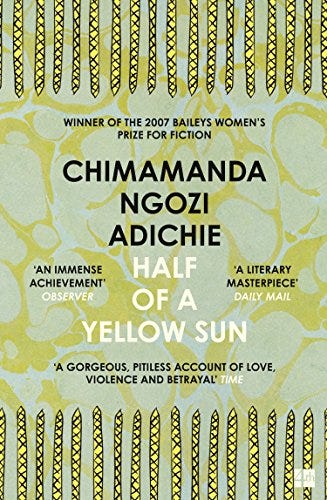#30TubeReads: Half of a Yellow Sun by Chimamanda Ngozi Adichie
Coincidences! Coincidences! Coincidences!
I have written stories since I was a pre-teen. My scribblings started out as poorly written scenes, obviously inspired by the authors I was reading at that point (Enid Blyton, J.K. Rowling, Rick Riordan). I even went through a brief, and maybe unfortunate, phase of writing massy romances on Wattpad, before it was completely revamped. (You might be able to find the surprisingly popular story I published on the platform if you dig deep enough. I would strongly advise against it!) Soon after that phase I started writing slightly more ‘serious’ short stories, with characters inspired from other books that I was reading or movies I was watching at that age.
But it took me a long time to take a step back and really pay attention to the fact that none of my characters looked or spoke like me, they didn’t come from families like mine, and they didn’t stay in cities like the ones I lived in. I was not a blue-eyed, golden-haired 10-year old from my Famous Five-inspired romps. Nor was I a messy bun-sporting, trench coat-wearing, New Yorker like my Wattpad stories would suggest. There is stereotype in the industry that most debut novels by authors are at least semi-autobiographical. We are meant to write what we know best. And yet, none of my characters were Bengali girls with curly, uncontrollable hair, haldi-stained nails, and massive, unruly families, from India.
Now I am someone who has engaged a fair amount with the argument that we cannot only write about our lived experiences. I have yet to really make up my mind about which side of the argument I stand on but I think that Salman Rushdie’s argument against autofiction is quite fair.
However, something needed to change about the stories I was writing. Mainly they needed to stop starring whitewashed characters, who would occasionally slip into Indian mannerisms. (I highly doubt that a 10-year old from the British seaside was ever actually threatened by their mother with a belan.) Around the time that I was doing my Bachelor’s in Mass Media with a specialisation in Journalism I watched Chimamanda Ngozi Adichie’s TED video: The Danger of a Single Story.
Her speech highlighted what was missing in my own writing. I was falling into the trap of a ‘Single Story’, thinking that stories about people like me, belonging to families like mine, those brought up in perfectly ordinary middle-class families were not important enough to be written about. There were so many stories that I was neglecting because of the need I felt to fit in with the stories I saw around me.
This is a bias that exists in the world, too. Stories, written by the winners, the rulers, the colonisers (surprise! surprise!) are prominent. They exist in the official documents, national archives, public records, and famous movies. While other stories get hidden and silenced. These are rich histories and personal narratives that never come out into the open. Entire histories, our histories, are kept from us! And the work required to get even a glimpse of them is exponential. The Biafran War, that Adichie writes about in Half of a Yellow Sun, is one such history that is never spoken about, except for when the target of photos of the malnourished children is a white, Western audience.
Richard exhaled. It was like somebody sprinkling pepper on his wound: Thousands of Biafrans were dead, and this man wanted to know if there was anything new about one dead white man. Richard would write about this, the rule of Western journalism: One hundred dead black people equal to one dead white person.
The idea of epistemic violence, with this book, is what I explored in the other essay that I wrote in the first semester of my Master’s. The third book that I reviewed for the #30TubeReads challenge was Sharp Objects by Gillian Flynn, which segued me perfectly into uploading my essay about novels with unhinged female main characters. So imagine my surprise when I entered a crowded Overground train and saw a woman reading Half of a Yellow Sun by Chimamanda Ngozi Adichie. This kind of proof that we live in a small world indeed makes me believe that one day I’m going to bump into Eddie Redmayne on the tube. (And then I’d probably ask him why the last Fantastic Beasts movie was such a travesty!) Anyway, back to the scheduled content.
The real tragedy of our postcolonial world is not that the majority of people had no say in whether or not they wanted this new world; rather, it is that the majority have not been given the tools to negotiate this new world.
In Half of a Yellow Sun Chimamanda Ngozi Adichie masterfully writes the stories of three interconnected people during the violence of Biafra’s struggle to establish an independent republic in Nigeria. The novel spans an entire decade and gives us both the outsider’s and insider’s perspective of the conflict through its main characters. The novel alternates between the perspectives of the three character, without ever feeling disjointed. Each character has something in common with the other: Olanna and Ugwu are both Igbo, Richard and Olanna both belong to a privileged class, and Ugwu and Richard both look at the world from the a writer’s lens, even though it is initially not evident in the case of Ugwu.
...my point is that the only authentic identity for the African is the tribe...I am Nigerian because a white man created Nigeria and gave me that identity. I am black because the white man constructed black to be as different as possible from his white. But I was Igbo before the white man came.
What ties all three of them together is their feeling of being an outsider throughout the book. Through these characters Adichie tries to push across the message that multiple truths and viewpoints exist about the same historical incident. The only way for us to get better insight into a conflict is by exploring all these multiple narratives. (An idea this book has in common with Minor Detail by Adania Shibli, also a book I reviewed here.)
How can we resist exploitation if we don’t have the tools to understand exploitation?
There is quality to Adichie’s writing, even though it isn’t flawless and seems to lack the polish that is visible in Americanah, that makes it possible to lose yourself in the story. For me this experience was even more drastic because I realised just how little I knew about the Biafran war. In the same way that years from now there will be people who just won’t know enough about Gaza and the Palestinians. In this book Adichie’s tendency to lean towards the melodramatic is especially evident. (There are evil women, a meddling mother-in-law, poisonings, and cheating husbands galore!) But this melodrama does not take away from the importance of the actual tale that Adichie is telling.
This was love: a string of coincidences that gathered significance and became miracles.
More than anything else this book is about identity. Adichie provides a nuanced and detailed explanation of the African tribes, and how crude borders drawn by the British caused extreme violence as the tribes fought for their land. (As an Indian I can confidently say: Been there! Seen that!) And through this discussion Adichie stresses the need to look for different sources of information. Ugwu becomes a representation of the reader in the novel. As Odenigbo, his Master, encourages him to study and look for opposing narratives, the reader is reminded over an over that there is a danger in falling for a Single Story and that the powers that may be will always want to bury some stories that are not beneficial to them or don’t show them in the best light.
This is our world, although the people who drew this map decided to put their own land on top of ours. There is no top or bottom, you see.
Adichie is an exceptionally talented writer and I genuinely recommend Purple Hibiscus and Americanah by her. For other books that discuss the postcolonial repercussions in Africa I think the essential read is Things Fall Apart by Chinua Achebe and for a more contemporary option it is Homegoing by Yaa Gyaasi. I personally also loved Stay With Me by Ayobami Adebayo. Additionally, on the topic of multi-generational stories about historical events that don’t get talked about enough, I highly recommend Pachinko by Min Jin Lee, How We Disappeared by Jing Jing Lee, and A Promised Land by Khadija Mastur, even though they are not about Africa.
There’s a lot more I can say about this novel. That’s mostly why I wrote an entire paper on it! (Shameless self-plug to the next blog!) But that is not to say I don’t have my fair share of problems with Adichie’s ideologies and politics. (Why do some authors ruin their legacy?) Still, I’m glad that the woman, who was so engrossed in the pages of the book that she almost missed her stop, gave me a reason to pick it up once again as part of the #30TubeReads challenge.


